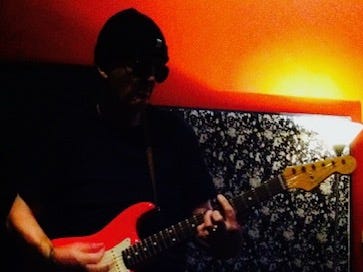Eric and George made it cry and sing - but being a guitar star is much harder than it looks
Turns out you actually need talent and dedication to be a six-string hero
By DAVID MYTON
As usual over Christmas in Australia musician Paul Kelly’s heart-tugging prisoner’s lament How To Make Gravy had a lot of airtime. The lyrics are great – Joe is banged up in prison and longs to be home with the family doing mundane stuff, including making the gravy for the Christmas dinner.
Fine words that they are, it’s the guitar work that pulls me in. It’s a reasonably conventional chord progression in the key of E, except Kelly doesn’t fully bar the chords, but instead leaves the first, second and sixth strings open as he plays up and down the neck.
Sonically this accentuates the song’s sense of longing, further embellished by some tastefully teary slide work.
Ah, guitars. I love them. But it has been, let’s say, a problematic relationship.
Here’s the thing – playing the guitar well is harder than it looks (ref Nick Cave Six strings that drew blood). It’s not a prop (ref The Whitlams Chunky Chunky Air Guitar); and it’s not something anyone can do (contra Radiohead/Thom Yorke Anyone can play guitar).
My guitar journey, such as it is, began on the evening of November 4 1963 in a council house situated in a small North Yorkshire city.
Four working-class Liverpool lads - The Beatles - appeared on the television, topping the bill at the Royal Variety Performance. They played four songs for the Queen Mother and other notables, plus millions of TV viewers: From Me To You, She Loves You, Til There Was You, and Twist and Shout.
I fell in love with The Beatles there and then, but I loved George Harrison the most. There he was, a little shyly playing that big wide-bodied Gretsch complete with whammy bar, pick-ups, and intriguing knobs and switches.
He looked and sounded perfect. I was gone. I wanted to be George and so launched the “I want a guitar and I want it now” campaign. Nobody took any notice and no guitar was forthcoming.
But who needs one when you have a vivid imagination? So I employed a cricket bat as my electric guitar and a tennis racquet as the acoustic. I was brilliant. I made that electric cry and sing; I chugged out chunky chords and rippling arpeggios on the acoustic.
Time passed and then one day as I tried on various “guitar faces” in front of the mirror while performing the solo from The Beatles Drive My Car, I was suddenly mugged by reality. Looking back at me from the mirror was a dumb kid with a cricket bat pretending to be a Beatle. Not long after I watched Eric Clapton on TV playing Crossroads with Cream at the Albert Hall with that snarly riff and so-cool blistering solos, and it dawned on me: to play like that I needed a real guitar.
With money earned delivering newspapers I bought a battered acoustic from a kid up the road, who also gifted me his guitar instructional book Play In A Day by some guy I’d never heard of, Bert Weedon.
It made no sense to me. The book seemed to be about music - notes and scales and harmonies and what not – and featured crummy old songs like Bobbie Shaftoe and Cockles and Muscles.
There had to be some kind of mistake. It seemed a million miles away from what The Beatles were doing on stage. Learning to play a real guitar was a hell of a lot harder than the cricket bat, that was for sure.
Time passed. I struggled to learn. I had no natural ability and the theory aspect made no sense to me. I didn’t even know how to tune the damn thing. My mother opined it sounded like a wailing cat. The guitar, along with Bert Weedon, were banished to the shed. I quit.
A few years later I went to study journalism at a college in Sheffield, South Yorkshire. Reading and writing had always seemed easy to me. But this was another league. It was hard work.
It wasn’t just about writing. We had to learn shorthand, typing, interviewing techniques, and how governments, public institutions and the law worked, among many other things.
Around this time I heard a song written by Ringo and produced with a lot of help from George Harrison. It included these lyrics: Got to pay your dues if you wanna sing the blues/And you know it don’t come easy.
It don’t come easy … Isn’t that the truth about anything worthwhile? I finally understood that George – composer of While My Guitar Weeps - and all the other good guitarists of any era, had dedicated themselves to mastering their instrument, practicing and playing live for hours on end.
A few months later I took up the guitar again. A fellow student gave me some lessons and as time went by I learned some chords and fancy stuff like pentatonic scales, double-stops, string bends, palm mutes, vibrato, slides, and the hammer on and pull off.
None of it was easy. Learning music did not come naturally to me. But I started to enjoy it once I understood that theory had a practical purpose and hadn’t been invented just to make life hard.
I never got good. But I got better than bad. And I’m ok with that. (And that’s me below, disguised as a guitar player and trying to be worthy of that Fender Strat.)




